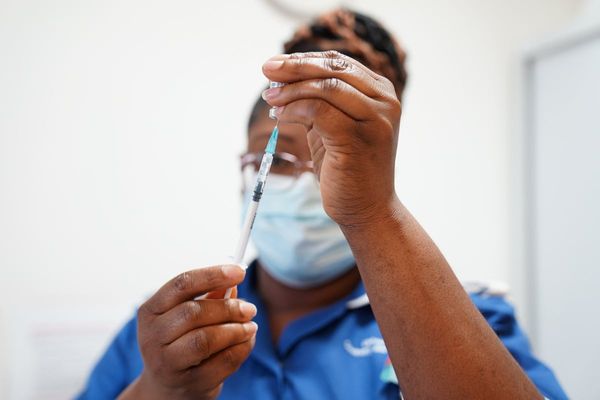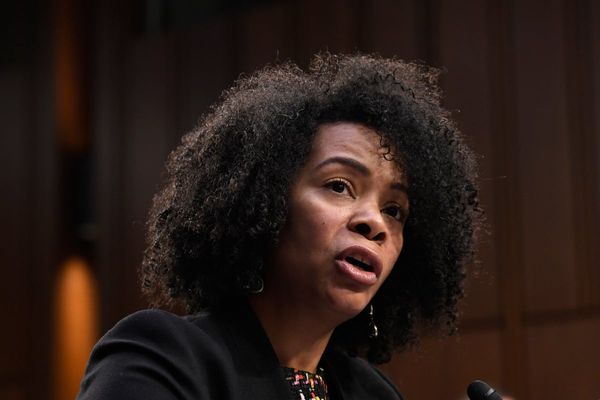
OLDONYIRO, Kenya—On a Tuesday morning at the Oldonyiro livestock market in November, Samaria Leyagu was doing what just a few years ago would have been unthinkable for a woman from her tribe: She was shopping for a goat.
Leyagu examined her options carefully, pausing at a skinny creature with black and tan fur. “5,000 shillings,” its owner said—just under $50. Leyagu picked up the goat, feeling its weight in her arms. A goat this thin was not worth 5,000 shillings. “2,500,” she countered. The owner shook his head. The market was not in Leyagu’s favor. Overnight rains prevented many would-be sellers from making the journey to the market, flooding it with eager buyers. She would return again the next week, when prices might be more reasonable.
Leyagu is a member of the Samburu tribe, semi-nomadic herders who settled in north-central Kenya several centuries ago. Culturally, little has changed since then. Livestock remains the Samburu people’s lifeblood. Men spend their lives grazing their herds, while women do the rest: fetch water and firewood, raise children, and take care of the homesteads. Gender roles are so strict that men often forbid their wives from handling money or even saying their husbands’ names out loud.
Now, for the first time in their history, it is slowly becoming acceptable for Samburu women to work for money—but not because men have changed their views on gender roles. Instead, climate change has made it so there’s simply no other way for them to survive. Driven by increasing drought, Samburu men leave for months searching for pasture with their herds—leaving women not only to manage the household but also to earn enough money to live in their absence.
Climate change disproportionately affects the world’s poorest and most vulnerable, including those in the drylands of northern Kenya, where Leyagu lives. The already brutal dry season has intensified in recent years, killing more vegetation, animals, and people than before. Relentless droughts have diminished the Samburu’s livestock by up to 85 percent, by their estimates. The dwindling resources have provoked conflicts with neighboring communities, and armed raiders routinely steal what remains.
With the traditional way of life now unsustainable, Samburu women have picked up jobs once reserved for men, such as trading livestock. “Getting into this business, we have control of what to sell and what not to sell,” Leyagu said. “Previously, it was only men who decided.”
While the droughts have been catastrophic, many Samburu women say they prefer being able to bring in income. Until recently, children tended to the herds instead of going to school. Many mothers can now pay the school fees that they couldn’t afford on their husbands’ earnings alone. “Children want to go to school, want food. We want clothing for the children. With money, we can do anything,” said Thureya Marro, a Samburu woman who began running her own shop last year.
The trend of women engaging in paid labor isn’t limited to the Samburu or even to Kenya. In parts of West Africa, women are taking on once forbidden roles because so many men have migrated in search of work. Much of the rural population in the Sahel region relies on small-scale agriculture, but rising temperatures and changes in rainfall have made such livelihoods increasingly precarious. Faced with few options, men have left in droves, migrating to Europe or other parts of Africa.
In several villages in the Kayes region of western Mali, for example, almost all the men have left, said Balla Sidibe, the country director for CARE in Mali. With the men away, women have taken over farming duties—responsibilities they never would have assumed before. Traditionally, “there was the belief that only men can do the hard work,” Sidibe said. “But in reality, the women are the ones doing that and producing for their families.”
Northern Ghana has followed a similar pattern. According to a CARE study, women have taken on greater workloads amid a dearth of men, which sometimes leads to discrimination. But at the same time, they also reported greater confidence and decision-making power. Men, for the first time, see women as capable of using the land and contributing to the household.
The shift toward women managing their own finances is leading to other changes, too. Nitya Rao, a professor of gender and development at the University of East Anglia, found that among the Borana in Kenya—whose gender roles resemble those of the Samburu—some women have even questioned the value of marriage, since men can no longer financially support women as they once did. “They’re saying, ‘What is marriage if you’re not getting anything out of it, except perhaps for getting pregnant?’” Rao said.
Newfound autonomy has emboldened some women to leave abusive situations. Leyagu left her husband in 2007 because he was beating her; now she is hesitant to marry again. If she does, her husband will have to support her independence. “I can’t ask for permission to do the same thing I was doing before,” she said.
Development organizations across Africa see these cultural shifts as a golden opportunity to foster women’s economic empowerment. Nonprofits aimed at training women in business and practical skills have flourished in the last several years, furnishing them with grants, access to credit, and other resources. Sam Owilly, the Kenya program director for the BOMA Project, which helps women run their own businesses, said husbands of women in the program in northern Kenya are largely grateful for the additional household income. “We’ve seen men’s perception change when the women no longer expect them to provide for the family,” he said.
While instrumental in promoting gender equality, aid organizations targeted at women leave many men without similar opportunities. As women embrace their autonomy, some men struggle with the fact that their own status as household providers has been destabilized. Lacking the credit and financial resources for significant enterprise, they turn to working construction or driving motorcycle taxis. In northern Kenya, many have turned to vices like drinking the herbal stimulant miraa or even crime. “Some of the younger men who do want to do something constructive are in quite a state of depression because there isn’t any support for them,” Rao said.
Moreover, women’s empowerment can be a double-edged sword: While economically and socially empowered, women can also be crushed under the work of running both a household and business without assistance. “My question would be, do they really need to do all that to have their voice?” Sidibe of CARE said. In northern Kenya, some women still face the risk of ridicule or violence for breaking with traditional gender roles.
But Owilly, with the BOMA Project, suggested that such instances are the exception rather than the rule, at least among his program’s participants. He and his colleagues have seen men pitch in with their wives’ businesses, helping them trade livestock or escorting them to the market—a new model for business.
Climate change is intensifying and leading to a shift in societal norms, in northern Kenya and beyond. Many organizations hope that as women assume more responsibility, they will take on leadership roles such as mediating the resource-related clashes plaguing pastoralist communities due to drought and other ill effects. If there is a sustainable path forward, responsibilities should be equitably shared.







